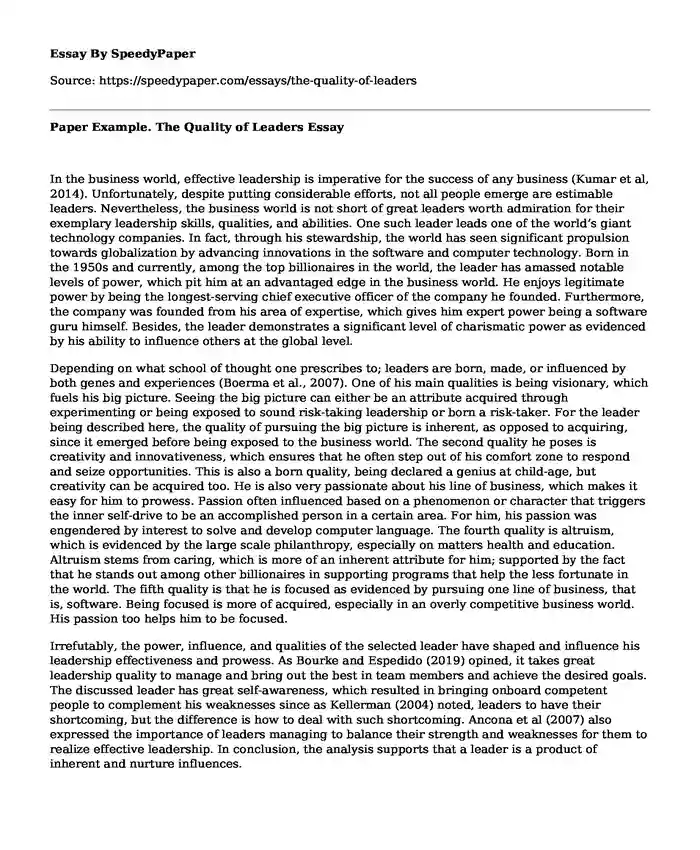
| Essay type: | Reflective essays |
| Categories: | Business Personal leadership Leadership style |
| Pages: | 3 |
| Wordcount: | 726 words |
In the business world, effective leadership is imperative for the success of any business (Kumar et al, 2014). Unfortunately, despite putting considerable efforts, not all people emerge are estimable leaders. Nevertheless, the business world is not short of great leaders worth admiration for their exemplary leadership skills, qualities, and abilities. One such leader leads one of the world’s giant technology companies. In fact, through his stewardship, the world has seen significant propulsion towards globalization by advancing innovations in the software and computer technology. Born in the 1950s and currently, among the top billionaires in the world, the leader has amassed notable levels of power, which pit him at an advantaged edge in the business world. He enjoys legitimate power by being the longest-serving chief executive officer of the company he founded. Furthermore, the company was founded from his area of expertise, which gives him expert power being a software guru himself. Besides, the leader demonstrates a significant level of charismatic power as evidenced by his ability to influence others at the global level.
Depending on what school of thought one prescribes to; leaders are born, made, or influenced by both genes and experiences (Boerma et al., 2007). One of his main qualities is being visionary, which fuels his big picture. Seeing the big picture can either be an attribute acquired through experimenting or being exposed to sound risk-taking leadership or born a risk-taker. For the leader being described here, the quality of pursuing the big picture is inherent, as opposed to acquiring, since it emerged before being exposed to the business world. The second quality he poses is creativity and innovativeness, which ensures that he often step out of his comfort zone to respond and seize opportunities. This is also a born quality, being declared a genius at child-age, but creativity can be acquired too. He is also very passionate about his line of business, which makes it easy for him to prowess. Passion often influenced based on a phenomenon or character that triggers the inner self-drive to be an accomplished person in a certain area. For him, his passion was engendered by interest to solve and develop computer language. The fourth quality is altruism, which is evidenced by the large scale philanthropy, especially on matters health and education. Altruism stems from caring, which is more of an inherent attribute for him; supported by the fact that he stands out among other billionaires in supporting programs that help the less fortunate in the world. The fifth quality is that he is focused as evidenced by pursuing one line of business, that is, software. Being focused is more of acquired, especially in an overly competitive business world. His passion too helps him to be focused.
Irrefutably, the power, influence, and qualities of the selected leader have shaped and influence his leadership effectiveness and prowess. As Bourke and Espedido (2019) opined, it takes great leadership quality to manage and bring out the best in team members and achieve the desired goals. The discussed leader has great self-awareness, which resulted in bringing onboard competent people to complement his weaknesses since as Kellerman (2004) noted, leaders to have their shortcoming, but the difference is how to deal with such shortcoming. Ancona et al (2007) also expressed the importance of leaders managing to balance their strength and weaknesses for them to realize effective leadership. In conclusion, the analysis supports that a leader is a product of inherent and nurture influences.
References
Ancona, D., Malone, T.W., Orlikowski, W.O. & Senge, P.M. (2007). In praise of the incompetent leader. Harvard Business Review, 85(2); 92 – 100. https://pubmed.ncbi.nlm.nih.gov/17345683/
Boerma, M., Coyle, E. A., Dietrich, M. A., Dintzner, M. R., Drayton, S. J., Early, J. L., Edginton, A. N., Horlen, C. K., Kirkwood, C. K., Lin, A., Rager, M. L., Shah-Manek, B., Welch, A. C., & Williams, N. T. (2017). Point/Counterpoint: Are Outstanding Leaders Born or Made?. American journal of pharmaceutical education, 81(3), 58. https://doi.org/10.5688/ajpe81358
Bourke, J. & Espedido, A. (2019, March 29). Why inclusive leaders are good for organizations and how to become one. Harvard Business Review. Accessed June 11, 2020 from https://hbr.org/2019/03/why-inclusive-leaders-are-good-for-organizations-and-how-to-become-one
Kellerman, B. (2004). Bad leadership: What it is, how it happens, why it matters. Harvard Business Press.
Kumar, S., Adhish, V.S. & Deoki, N. (2014). Making sense of theories of leadership for capacity building. Indian Journal of Community Medicine, 39(2); 82 – 86. https://doi.org/10.4103/0970-0218.132721
Cite this page
Paper Example. The Quality of Leaders. (2023, Aug 27). Retrieved from https://speedypaper.net/essays/the-quality-of-leaders
Request Removal
If you are the original author of this essay and no longer wish to have it published on the SpeedyPaper website, please click below to request its removal:
- Free Essay with Disadvantages of Buying Hybrid Vehicles
- Free Essay Sample about Local Pension Liabilities: Loyalty and Ethical Systems
- Essay Sample on Tourism in Ireland
- Analysis of New Market Segment. Paper Example
- Free Essay Example - TQM Planning
- Essay Sample on Boeing Composites Challenges
- Essay on Operations Management: Challenges, Solutions, Strategies for Profitability
Popular categories




